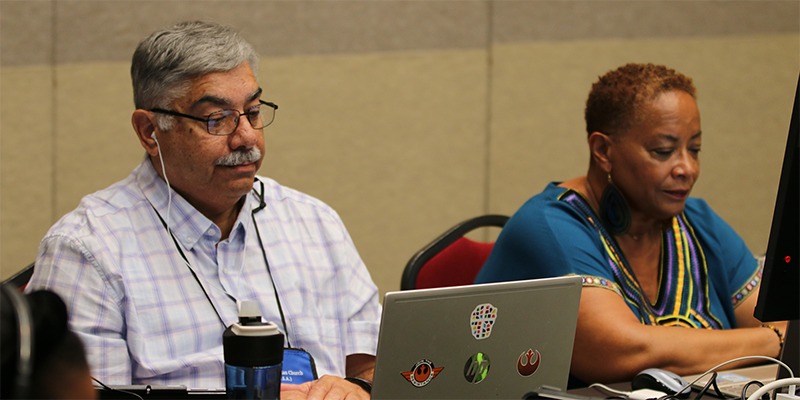
Teaching Elder Commissioner Rubén Ortiz-Rodríguez, committee vice-moderator, and Ruling Elder Commissioner Rochelle Shaw, committee moderator, convene the International Engagement Committee in its first meeting on June 25, 2024. Photo by Randy Hobson

Teaching Elder Commissioner Rubén Ortiz-Rodríguez, committee vice-moderator, and Ruling Elder Commissioner Rochelle Shaw, committee moderator, convene the International Engagement Committee in its first meeting on June 25, 2024. Photo by Randy Hobson.
The International Engagement Committee, moderated by Rochelle Shaw of San Francisco Presbytery, kicked off its 226th General Assembly business agenda Tuesday morning. Before going into an executive session, which was designed to help build a covenant on how to honor each other’s voices as committee members prepare for the week’s work, there was a brief worship and orientation session focused on committee and parliamentary procedures. The Rev. Dr. Daris Bultena, the committee’s parliamentarian, summarized the process and tools that each commissioner would be using for making recommendations to the larger Assembly during next week’s plenary sessions.
After executive session, the committee heard from Sue Rheem, coordinator for the Presbyterian Mission at the United Nations and a committee resource representative. She provided participants a summary of how PC(USA) engages internationally. Rheem noted Presbyterians are free to engage in policy advocacy individually and collectively in any they feel called to do. However, “our advocacy efforts are often more powerful and effective when we speak together as the PC(USA).”
The committee began with open hearings from participants who signed up to speak in favor of, or in opposition to, the four overtures being considered, but only two overtures were addressed. The morning hearings started with INT-05, On Confessing our Complicity in Christian Zionism.
First to speak in opposition to INT-05 was Rabbi Yehiel Poupko, a rabbinic scholar at the Jewish Federation of Metropolitan Chicago who in the early 2000s wrote an analysis of an overture against Christian Zionism adopted by the PC(USA) in 2004. Poupko was passionate in his opposition to the original overture. At that time, he stated, “The more that the church attacks Israel and American communal support for Israel and devote more resources to attacking, the more the church will wither.”
“Foreign affairs is the last refuge of failing churches,” he noted, before going on to say that the overtures will pass no matter what he says, however, “Do note these overtures will have no impact in Israel, Gaza and West Bank and will only widen the existing gulf between PC(USA) and the organized Jewish community.”
Two more participants were scheduled to speak in opposition to the overture, however, they were not available or present to speak during the allotted time slot. There were several pro-overture individuals speaking in favor of approving INT-05. Among them were Elizabeth Hengen of Durham, North Carolina, who noted that as a mainline American church with global reach, the PC(USA) bears a responsibility to examine its historical involvement in Christian Zionism.
“Today we watch in horror as a theological vision becomes a nightmare for families in Gaza,” said Hengen.
The Rev. Emily Brewer, an interim pastor for Lafayette Presbyterian Church in New York City, confessed her complicity in Christian Zionism.
“I’m a pastor in one of the most religiously diverse places in the country, so I know how important our religious and interfaith relationships are,” said Brewer. “And I know that Christian Zionism undermines those relationships.”
Rev. Prof. Dr. Mitri Raheb, a Palestinian Christian and Lutheran pastor whose views on the Israel-Palestine conflict and Christian Zionism have been well documented for PC(USA) audiences, also weighed in, stating that Christian Zionism as we know it today is a Christian lobby that supports Jewish settler colonization of Palestinian land by using biblical and theological constructs.
The morning session concluded with open hearings for INT-06, Educational Resources for Seeking Ways to End Israeli Apartheid.
Both pro and con speakers spoke to the overture. Those opposed felt using the term “apartheid” was needlessly inflammatory. Speakers backing the overture felt that in times of complex discussions good, reliable resources were more important than ever.
After a brief hiatus due to technical issues with the voting function, the afternoon session got down to committee business with INT-01, On Support of the People of Guatemala. Overture advocates Carrie Saathoff and Doug Michael spoke to the overture, both speaking eloquently about the people and partners in Guatemala.
Saathoff, elder at Westminster Presbyterian Church in Wilmington, Delaware, and co-chair of the Guatemala Partnership of New Castle Presbytery, noted that Presbyterians have been serving in Guatemala since 1882. Although our partnership and the way we do mission have evolved over that time, many PC(USA) churches continue to walk alongside and build strong relationships.
“[Our relationships] transcend walls and borders, cultures and languages, fears and falsehoods,” said Saathoff. “Together we dream, take risks and celebrate successes through these partnerships.”
INT-01 was approved unanimously for Assembly consideration with two amendments that replaced the term “brothers and sisters” with “siblings.” Another amendment replaced a reference to current U.S. President Biden specifically by name, replacing it with the more generic term “U.S. administration.” A third amendment that proposed similar language in removing the Guatemalan political leadership names was voted down.
INT-02, That the Presbyterian Church (U.S.A.) Utilize the Gospel of Love as a Guiding Principle in its Advocacy and Humanitarian Efforts, was the second overture considered by the committee late in the afternoon session, however, discussion or voting could not completed before the committee recessed for the day.
Joseph Reid, a retired Christian minister from Yukon Presbytery, was the overture advocate for INT-02.
“True and lasting peace can only be achieved through love and non-violence,” said Reid. “The Gospel of Love compels us to seek peace and reconciliation, and to act with compassion and mercy.”
Wednesday’s business will open with further discussion and a vote on INT-02, and consider INT-05 and INT-06.
